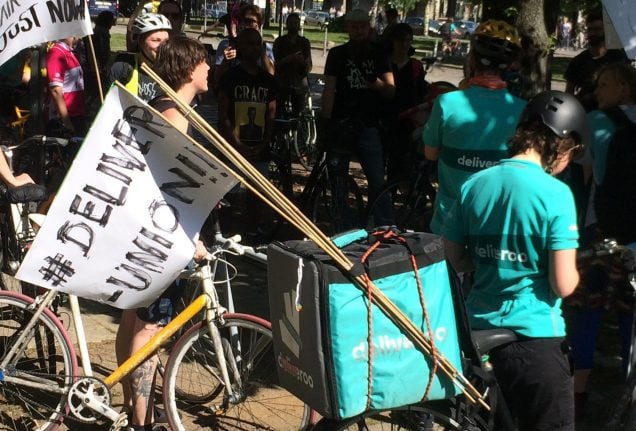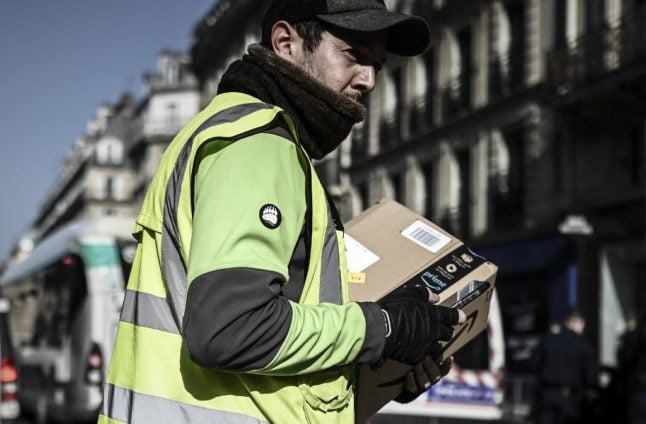About 40 to 50 bike couriers met in the hip Kreuzberg district of Berlin on Thursday afternoon to protest for better pay and conditions.
“I’m here for solidarity with my colleagues,” explains Deliveroo courier Javier Mardones, 32, originally from Chile.
“Slowly the conditions are getting worse. They pay you one euro less every month, or they make you wear a uniform when they didn’t before. They just don’t seem to consider out situations.”
The union FAU has been slowly organizing food couriers to collectively fight for demands such as earning one euro more per delivery or hour (depending on employment structure), and having an additional paid hour per week to plan their shifts. The group also want more transparency about working hours, and a guarantee that each biker receives enough hours to make a living.
“I’m protesting because of the lack of security, and the fact that there aren’t enough hours,” says British foodora rider Sam from Newcastle.
“They used to guarantee hours, but they’ve stopped doing that now. We have to spend hours at home just messaging other riders to get more hours, and we’d like pay for those administrative hours.”
Sam from foodora said that there aren't enough hours guaranteed. #deliverunion @TheLocalGermany pic.twitter.com/XZ4dDcR4pZ
— Julius Haswell (@JuliusHaswell) May 18, 2017
Berlin-based foodora told The Local previously that its riders are one of the “pillars” of their work, and asserted the importance of the “enthusiasm” with which “they lovingly bring every order to the door or office.” They were also keen to emphasize their working conditions and how unlike Deliveroo, they do not hire anyone on a freelance basis.
Because British-based Deliveroo hires riders as freelancers, it can pay them less than the German minimum wage of €8.84.
Another demand of the couriers is for all bike repair costs to be covered. The delivery companies do not cover the costs of bikes or necessary internet-connected phones for their riders.
Both Deliveroo and foodora have seen strike action in London and Turin, respectively, after disputes about incentive-based payment, as opposed to a guaranteed wage.
According to broadcaster N-tv, both companies have expressed a willingness to talk with their couriers. Foodora said it was “open to further talks with both our riders and their representatives on equal footing.”
But the companies have also rejected the riders’ claim that they hire too many riders so that workers do not end up with sufficient hours and income. Foodora, for example, was founded just two years ago in Berlin, and now has more than 2,500 contracted employees in Germany alone.
The companies said that in fact, the growing number of riders corresponds with growing demand.
And both also say that according to company surveys, their workers are generally satisfied with their current conditions.
But those at the protest on Thursday did not seem to reflect this sentiment.
“I’ve been working for more than a year and I’ve found that we all feel like we’re the last in the line,” says Foodora biker John R., 34, from Prenzlauer Berg.
“They don’t seem to care about anything but profits, even though we’re the face of the company. Everything they do is to make their lives easier, and our lives harder. The job is cool, but the company sucks.”
SEE ALSO: Hard and fast – the life of a Berlin food courier
Reporting by Julius Haswell



 Please whitelist us to continue reading.
Please whitelist us to continue reading.